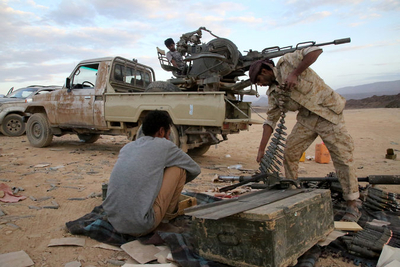Officials representing the Yemeni government and Houthi rebels agreed to a seven-day ceasefire during negotiations in Geneva, Switzerland on Tuesday. UN mediators hope the move will facilitate wider peace talks to end the nine month-long war on the Arabian Peninsula that involves over 34 nations.
Reports on the ground in Yemen suggest the temporary truce was indeed holding, with only an incident of small arms fire and limited mortar fire between the two sides. The Saudi-led military coalition fighting the rebels also agreed to pause the air campaign it has been waging in the country. The decision follows a ground attack that killed two senior commanders with the coalition, one from Saudi Arabia and the other from the UAE, hours earlier in the southwestern city of Taiz.

Tribesmen supporting the central government prepare ammunition in Sirwa, Yemen on Monday, before the ceasefire with Houthi rebels. (Photo: AFP) |
The next step for the parties would be to define a ceasefire “without time limit,” according to moderator Ismail Ould Cheikh Ahmed, a UN Special Envoy. Then a series of confidence building measures would help set the stage for discussions over withdrawing militias from certain areas, prisoner exchanges, and the disarmament of heavy weapons, as well as resuming wider political dialogue.
Tuesday’s temporary truce, and movement toward a permanent peace agreement, would help alleviate two acute problems inflamed by the war—Yemen’s humanitarian crisis and jihadist terrorism. Since fighting started earlier this year, the UN estimates that the conflict has claimed the lives almost 6,000 civilians and more than 1.3 million people have been displaced. The ceasefire would enable humanitarian agencies to ease the plight of civilians outside major cities. Already, nineteen World Health Organization (WHO) trucks based in Aden and Sanaa have been able to start delivering much needed medical supplies. The agency expects to move another 165 tons from its facilities in Djibouti to the country in the next few weeks.
Jihadist groups have also been able to capitalize on the political vacuum created by Yemen’s civil war. The conflict prompted the withdrawal of U.S. military personnel that had carried out out targeted strikes against al-Qaeda’s local affiliate, al-Qaeda in the Arabian Peninsula (AQAP). That group now firmly controls its own territory and has made advances in the south, including in the provincial capital of Zinjibar and the city of Ja’ar. AQAP has set up checkpoints and launched direct and asymmetrical attacks on government forces, including a well-coordinated suicide bombing and gun battle that killed 30 troops late last month.
Not to be outdone by their jihadist rivals, Islamic State’s Yemen branch has also initiated bombings against state officials and has declared its own ambition to establish a Sharia caliphate.
Ultimately, a long term deal between the Iranian-armed Houthis rebels and the Saudi-backed central government would not only be beneficial to the people living in Yemen, but to U.S. interests as well. Even if a peace agreement is reached, the increased presence of al-Qaeda and Islamic State in the Peninsula will still pose a threat to regional stability for years to come.

